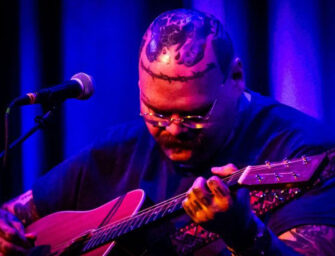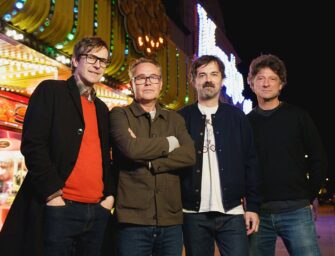
Martin Terefe: “Almost every time you do it it’s a surprise. You come into a room and there’s nothing there, and then two hours later there’s something!” Photo: Julian Broad
The award-winning Swedish producer, songwriter and musician talks about his 25-year career and decision to finally release a solo album
London-based, Swedish-born Martin Terefe is an acclaimed producer, songwriter and musician, as well as the founder of Kensaltown Recording Studios and an integral part of art collective Apparatijik. For 25 years, Martin has produced Grammy, Brit and Juno award-winning albums, and worked with artists as diverse as Jason Mraz, Mary J Blige, Cat Stevens, Luis Fonsi and KT Tunstall.
His productions of I’m Yours (Jason Mraz), Hey Soul Sister (Train) and I Took A Pill In Ibiza (Mike Posner) are part of American chart history, with Terefe being named one of the top 10 most successful music producers of hit songs on Billboard’s Hot 100 singles chart in 2009.
Whilst helping other artists create award-winning music, Martin has been silently contemplating a solo artistic venture. After years of procrastinating on a preferred format (be it film, visual art, a book), he began working on what came most naturally to him: a collection of personal songs, the lyrics adapted from poems, notes and ideas jotted down over the years. These evolved into The Involuntary Gardener, an album of 11 intimate and atmospheric songs that Martin describes as, “observations, reflections and stories from my life. About love and loss; hope, dreams, fear and frustration.”
Here, we learn about Martin’s experience being signed to a publishing deal as a teenager, his insights into the creative process, the overlapping roles of producer and co-writer, all the way through to his decision to finally release a debut solo album, all these years later…
Tell us about your upbringing. Were your parents into music?
“I didn’t really have any music historically in my family, but I grew up in Caracas in Venezuela and our neighbour’s kids had a guitar teacher. I got really curious and asked my parents if he could come and teach me, and he did. I guess I was seven or eight years old. He had a book where he’d write down the lyrics to a Spanish folk song or something, then he taught me the chords and I realised he probably only knew four chords! They were kind of the same on every song, but it was a very songwriter way of learning music.
“I moved back to Stockholm when I was 10 and a few years after I had a band and I was writing songs for them. I signed my first publishing deal when I was 15, so it really started with songwriting for me.”
That was amazing to have that break so soon. How did that come about?
“I was in a rock band and we were playing some local gigs and there was a publisher that was very sure we were going to go on and do something! He signed me to a publishing deal because I wrote the songs in the band, but very quickly after that I became more interested in all other sorts of music that was around me and I started writing songs with other people in a little room at the publishing company. And because I was 15 years old, I got paid in gear! So that bought me a home studio – a really nice one, actually – and they gave me some pocket money so I didn’t have to work weekends. So the band thing really derailed quickly into writing and recording demos for other projects and friends.”
What sort of projects were they? Did you start working with Ron Sexsmith at that point, or did that come later?
“I never really wrote with Ron, apart from a Christmas song we wrote together once, but I produced a lot of his stuff – I’ve made three albums with him. The first major label things I did as a producer were with Swedish artists and that was in the early 90s. I started working in London a little bit through ’93-94 and then I moved here in ’96. So, for a very long time, I was working with a lot of indie bands and singer-songwriters. One of them was Ron but it was later. I think we recorded our first full album together, Cobblestone Runway, in 2000. I was still writing a lot during that time, but the production thing became a big part of what I did as well.”

Martin Terefe: “Unless you find that lyrical idea and the thing you really want to say, it’s never going to get finished.” Photo: Julian Broad
How did you see the role of the producer and songwriter overlap? Was it as clear-cut back in the 90s or had it started to blur?
“I think it’s very different for different people because the classic writer-producer is definitely more established now. There were a bunch of people like that already back then, especially in the pop world. One of the reasons I wanted to get out of Sweden was because I wasn’t really into that sort of music – I was into indie bands and grew up with a lot of classic singer-songwriters, so the music I listened to was either American or English. And I loved lyrics. So ironically… and I think that’s how my career ended up being… like a lot of the writing I’ve done has been a very different thing than the production I do.
“With production, I’m definitely more open to producing any kind of music that I like and gets me excited. So I’ve ended up doing a lot of production in quite a few different genres. Whereas songwriting it’s a bit more of a personal endeavour and I’ve ended up writing with artists that I have good relationships with. Over the years, I’ve had some hits with different publishers – for the first 15 years after moving to London I was with Sony ATV and the last seven or eight years I’ve been with Universal – but I always found it difficult to write with like four people and doing ‘committee’ writing.
“So I think, for me, there was a very natural separation between songwriting and producing. Also, the people I was most interested in producing were really great songwriters! For instance, Ron Sexsmith and Martha Wainwright were artists and records I really wanted to make – the drawback was that they wrote their own songs. So from the beginning, there was quite a big separation: when I discovered production I got really nerdy with all the gear, equipment, drums and even electronic stuff, but when I wrote it was generally on the piano or the guitar. In production, I was quite experimental, but with songwriting, I always loved the classic stuff, so there were some natural boundaries. But recently they overlap more and more, and I’m involved in projects where I’ve been writing, producing and developing bands, and also my own music that I’ve put out entirely under my own name.”
When you’re hired to go into a session, do you like to be clear what your role is?
“I have so many different kinds of relationships… With KT Tunstall, for instance, we started writing songs together very early. Other Side Of The World was a big song from her first album that was one of the first songs we ever wrote together. We wrote quite a few songs on that first album and continued to write, but I’ve only produced very little of her stuff, so mostly, it’s been a writing project. Early on, I think a lot of production projects came from writing with people and discovering that, ‘Oh this is quite exciting,’ and it moved into production.
“Once I started having hits as a producer, labels came and asked me to produce their artists and generally they came with their own songs. Sometimes that would lead into us writing songs further down the line, once we’d been in the studio for a while, so I think everything leads into each other a little bit. Then there are artists that I’ve known for years, we meet up and it can be anything.
“When I took on making an album for a major label with an established artist, it was the music side but also to manage the project – deciding what to spend the money on and that kind of stuff. And in that situation, it was important to have some kind of boundary so that I didn’t take on a job and then they come in and say, ‘Hey, can we write a song?’ So every situation is different.”
You explained how your relationship with KT Tunstall developed, but can you tell us about different approaches you’ve tried with other artists?
“Yeah, totally. I haven’t done a lot of starting from tracks – I’ve been involved a few times in writing toplines for something that’s already a track – but generally, with most people I’ve written with, like Jason Mraz or James Morrison, it’s started from either sitting at the piano or guitar. I’ve always written in that way, and maybe that’s also the result of being a musician… I don’t know, I always found it so much easier to start with the song and then decide what to do with the production.”
Do you prefer to have the artist in the room with you throughout that process, or are you happy to collaborate remotely?
“I think with songwriting it’s always been a very collaborative thing, for me. I mean, I’ve written a lot of songs on my own and some of them other people have cut, but I haven’t done a lot of sending stuff back and forth. Sometimes you’ll start a song when you’re together and it doesn’t really go anywhere, so you think, ‘Oh I’ll go away and work on it,’ but quite often they never get finished! If there’s a vibe and energy and you write something, and there might be a little bit of something missing – maybe some words in the second verse – that can get done later. But if there isn’t a substantial start then, in my experience, it just fizzles out and ends up being one of those hundreds or probably even thousands of little seeds in your computer library! Sometimes it is fun listening back to them but it’s an odd process for me to go back to them, so generally I start over again.”
It’s clear you have a proven process that you can trust but have you ever been surprised by a completely new technique? Or can you think of a moment when you’re reminded how mysterious and unpredictable songwriting can be?
“That’s a good question… I think that’s the key to everything: it is a mystery. And the reason I find it difficult to answer that question is that I think almost every time you do it it’s a surprise. You come into a room and there’s nothing there, and then two hours later there’s something! How that happens is different because sometimes you come in and you have something on your mind you can bring into the session, or someone comes in with a chorus… Every situation is different but quite often you’re with another human being and there’s just nothing, no one has brought in anything – especially with a more established artist who has been out there touring, they have less stuff collected to bring into the session. And also I’m working in the studio every day so I don’t often go back and start looking at stuff. So it’s quite a magical process every time.”
So what would you say is the key element to nail down first that can make that process more tangible?
“I think it’s the lyric that often drives it along because you can sit and talk about something, and those words take something from being a little thing going around in your head to actually being a finished song. Unless you find that lyrical idea and the thing you really want to say, it’s never going to get finished.”
How did you approach your debut solo album? Is this a collection of songs you’ve been working on for years and holding back for the right time, or had you just got to a point where you wanted to start focusing on your own stuff?
“[Laughs] I don’t know!… I think there was a point when I thought, ‘Okay, I’m going to make an album.’ I had some songs I’d written that didn’t really fit in anywhere else. So I don’t know what triggered it, but there was a moment when I wanted to go through the process of doing something that I had no outside input on. It actually involved more than the songwriting activity because, after producing records for so many years – I have studios and people working for me – I’m used to working with musicians in the studio all the time, and an engineer. If I go back 15 or 20 years, I was still doing everything myself, so I think I felt I’d lost touch a little bit with that. I was feeling increasingly detached from the stuff I was doing. So it was a combination of wanting to make my own music and wanting to do it without having to make any kind of joint-decisions with anyone.
“And in the process, I learnt a lot. One of the things I’m quite good at – when I work with other people – is to stop procrastination. As a producer, I’m not the guy who has limitless patience, so I think that has given a lot of energy and confidence that we will finish up when we go in the studio together. Then when I started doing it myself, I realised it wasn’t quite that easy! I found it was a really interesting experiment, putting myself on the other side. Even though I was used to all the different parts of what I was doing, it was totally an opposite type of experience.”
So it was a challenge and free-ing at the same time?
“Yeah, it was a bit of a long process – not the songwriting. Most of them I actually wrote in the same year. Some of them had been lying around. Then, when I finally decided to make the album, I did most of it in a few months.”
We read that you’ve created a film to accompany the album. That’s quite unusual as it’s normally the other way around, or there’s a music video created for a single track – not a whole LP!
“Yeah! They didn’t really have a connection at the beginning. I was trying to get myself on social media and I was on a train – I’d been working with Shawn Mendes in Toronto – and I had another session in New York the week after, but I had the weekend off, so I decided to take the train and didn’t realise it was going to take like 16 hours! It went through some beautiful parts but most of it was real American, old industrial, abandoned towns between Upstate New York and the Canadian border. So I started making a short film, out the window, using iMovie on the phone and decided to post it on Instagram. I decided to keep making a short film every day for a week and then did it for a year – just a 10-second clip every day.
“Then, years later, when I was making the album, I wondered what would happen if I put them together. And that’s essentially what I’ve done. I mean I’ve given it a bit of editing, but it was just visual chaos really – there’s no narrative of any kind. It was amazing how the pictures look totally different when there are words going with them.”
Interview: Aaron Slater
































Related Articles